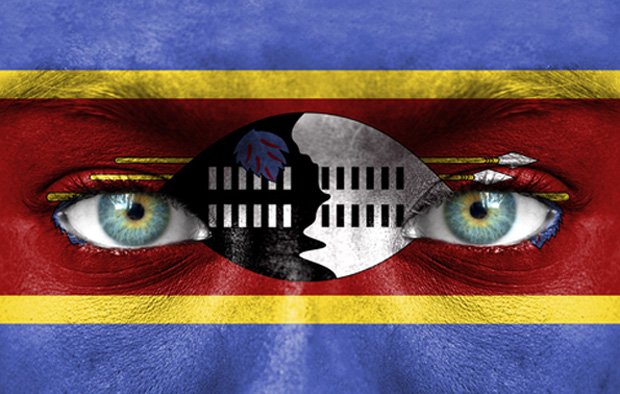The case against human rights lawyer Thulani Maseko and journalist and editor of the independent Nation magazine, Bheki Makhubu, resumes today in Swaziland after adjourning over Easter. The two were arrested last month, and face charges of “scandalising the judiciary” and “contempt of court”. The charges are based on two separate articles, written by Maseko and Makhubu and published in the Nation, which strongly criticised Chief Justice Michael Ramodibedi, levels of corruption and the lack of impartiality in the judicial system in Swaziland.
Makhubu’s home was raided by armed police, and the men were initially denied the right to a fair trial when their case was heard privately in the judge’s chambers. They were also denied bail as they were deemed to pose a security risk. Over the last few weeks, they have been released, and re-arrested in a highly unconventional course of events, so far spending 26 days in custody.
Last week, armed police blocked the gates of the High Court and stopped members of the public and banned political parties from attending the case. Continuous requests to move the case to a larger courtroom so that journalists, observers and family members could monitor proceedings have been refused. The Judicial Service Commission (JSC) said this was in order to minimise disturbances in the court.
There was public outcry as the two men appeared in court bound by leg irons. This highly unusual treatment has been described as “inhumane and degrading” by the Swaziland Coalition of Concerned Civic Organisations (SCCCO). When questioned on the issue, Mzuthini Ntshangase, Commissioner of His Majesty’s Correctional Services told the media to “stay away from [commenting on] security matters”.
Maseko and Makhubu’s lawyers have claimed that the arrests are a blatant form of judicial harassment intended to intimidate the accused and are unconstitutional, unlawful and irregular. They are currently being held in a detention centre in the capital Mbabane, and journalists have been prevented from visiting.
The local press has faced severe censorship of its reporting on the case. The JSC warned the media and public against commenting on the case. It argues that: “[Freedom of expression] is not as absolute as the progressive organisations and other like-minded persons seem to suggest.” Managing editor of The Observer newspaper, Mbongeni Mbingo commented on the case in his editorial: “For now though, the rest of us will do well to toe the line, and hold our breath and mourn in silence for our beautiful kingdom.” One local journalist said he was scared to comment on the situation for fear of arrest – or worse.
Maseko and Makhubu’s articles highlighted the disturbing case of Bhantshana Gwebu, a civil servant employed to monitor the abuse of government vehicles, who was arrested after stopping a high court judge’s driver for driving without the required documentation. Gwebu was detained for a week without charge and initially denied the right to representation. He now also faces a contempt of court charge.
In his article, Maseko wrote that “fear cripples the Swazi society, for the powerful have become untouchable. Those who hold high public office are above the law. Those who are employed to fight corruption in government are harassed, violated and abused”. He described how the Swazi people have lost faith in the institutions of power, as cases like Gwebu’s show how such institutions are being used to settle personal scores “at the expense of justice and fairness”.
Their case has sparked both local and international condemnation, from civil society organisations and the Swazi business community, as well as EU representatives and the American Embassy. “The only crime in this case is judges abusing the judicial system to settle personal scores,” says CPJ Africa advisory coordinator Mohamed Keita. The Law Society of Swaziland has called the arrests an “assassination of the rule of law”. They claim that the Swazi court had become the persecutor instead of the defender of the rights and freedoms of the people. But many in the country are still scared to speak out. The media operates under strict government imposed regulations. Journalists are often forced to exercise various forms of self-censorship when reporting on sensitive issues.
The arrests and the continuation of an abysmal human rights record could have wider implications for Swazi society and the economy. The situation threatens to further derail Swaziland’s highly beneficial African Growth and Opportunity Act (AGOA) with the United States, which is currently being reviewed in Washington. AGOA requires that a country demonstrates that it is making progress towards the rule of law and protection of human rights — including freedom of expression. “There is peace in Swaziland,” the head of the country’s Federation of Trade Unions, once said, “but it’s not real peace if every time there is dissent, you have to suppress it. It’s like sitting on top of a boiling pot.”
This article was originally posted on 22 April 2014 at indexoncensorship.org





